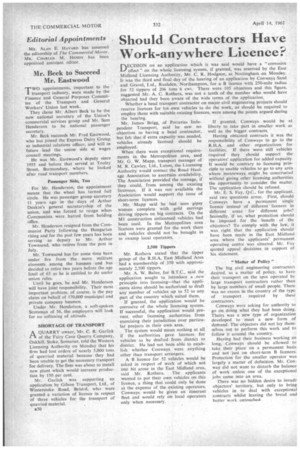Should Contractors Have Work-anywhere Licence?
Page 38

If you've noticed an error in this article please click here to report it so we can fix it.
DECISION on an application which it was said would have a "corrosive effect" on the whole licensing system, if granted, was reserved by the East Midland Licensing Authority, Mr. C. R. Hodgson, at Nottingham on Monday.
It was the third and final day of the hearing of an application by Conways Sand and Gravel, Ltd., Rushden, Northampton, for a B licence with 250-mile radius for 52 tippers of 206 tons 6 cwt. There were 105 objectors and this figure. suggested Mr. A. C. Rothera, was not a tenth of the number who would have objected had they been aware of the wide terms of the application.
Whether a head transport contractor on major civil engineering projects should receive licences for his own vehicles to do the work, or should be required to employ those with suitable existing licences, were among the points argued during the hearing.
Mr. James Brigg, of Potteries Independent Transport, said he saw no objection to having a head contractor, but felt that if extra capacity was needed, vehicles already licensed should be employed.
When there were exceptional requirements in the Metropolitan area, said Mr. G. W. Mapp, transport manager of M. R. Cawley, Ltd., Luton, the Licensing Authority would contact the Road Haulage Association to ascertain availability. The Association provided the tonnage, if they could, from among the existing licensees. If it was not available the Association would support the issue of short-term licences.
Mr. Mapp said he had seen gipsy women complete with gold earrings driving tippers on big contracts. On the MI construction unlicensed vehicles had been used, In the Metropolitan area licences were granted for the work there and vehicles should not be brought in to swamp local operators.
2,500 Tippers
Mr. Rothera stated that the tipper group of the R.H.A. East Midland Area had a membership of 350 with approximately 2,500 tippers.
Mr. A. W. Bake, for B.T.C., said the application sought to introduce a new principle into licensing—that the applicants alone should be authorized to draft any number of vehicles up to 52 to any part of the country which suited them.
If granted, the application would be corrosive of the whole licensing system. If successful, the application would prevent other licensing authorities from exercising their jurisdiction over particular projects in their own area.
The system would mean nothing at all if the authorities gave licences for vehicles to be drafted from district to district. He had not been able to establish whether Conways were anything other than transport arrangers.
A B licence for 52 vehicles would be asked in respect of work of which not one bit arose in the East Midland area, said Mr. Rothera. The applicants wanted to put their own vehicles on this licence, a thing that could only be done at the expense of the existing operators. Conways would be given an itinerant fleet and would rely on local operators only when necessary. If granted, Conways would be at liberty to take part in smaller work as well as the bigger contracts.
Having obtained contracts it was the responsibility of Conways to go to the R.H.A. and other organizations for
facilities. If there were. still vehicles required they should support the operators' application for added capacity. It would be contrary to licensing principle to enable vehicles to go to any area where motorways might be constructed without giving other licensing authorities the opportunity to consider the matter. The application should be refused.
Mr, E. S. Fay, Q.C.. for the applicant. said two questions arose. First, should Conways have a permanent single licence instead of different • licences in different areas for different jobs? Secondly, if so, what protection should be imposed for the benefit of the objectors? To comply with the law, it was right that the application should have been made in the East Midland area where the applicants' permanent operating centre was situated. Mr. Fay quoted appeal decisions in support of his statement.
"Matter of Policy" The big civil engineering contractors desired, as a matter of policy, to have their transport on the spot operated 1:o, large transport contractors rather than by large numbers of small people. There was no excess in the country of the type of transport required by these contractors.
Conways were asking for authority to go on doing what they had been doing. Theirs was a new type of organization developed to meet a new • form of demand. The objectors did not lay themselves out to perform this work and to follow it around the country.
Having had their business working so long, Conways should be allowed to take their place on a permanent basis and not just on short-term B licences. Protection for the smaller operator was largely a matter of definition. Mr. Conway did not want to disturb the balance of work unless one of the exceptional jobs came into an area.
There was no hidden desire to invade objectors' territory, but only to bring vehicles in to deal with exceptional contracts whilst leaving the bread and butter work untouched.
































































































































